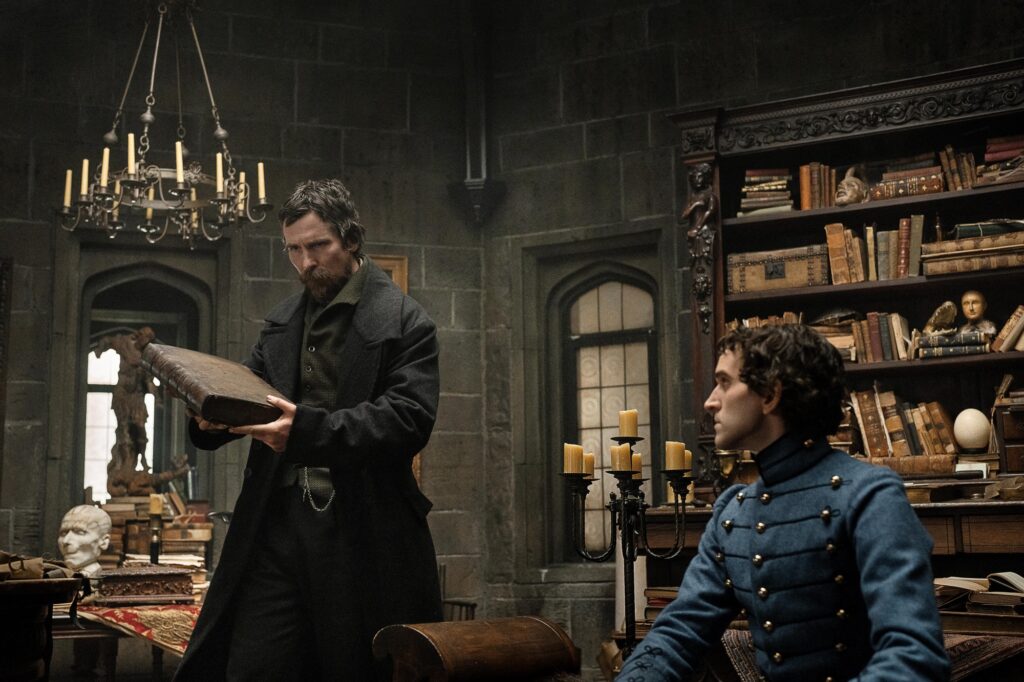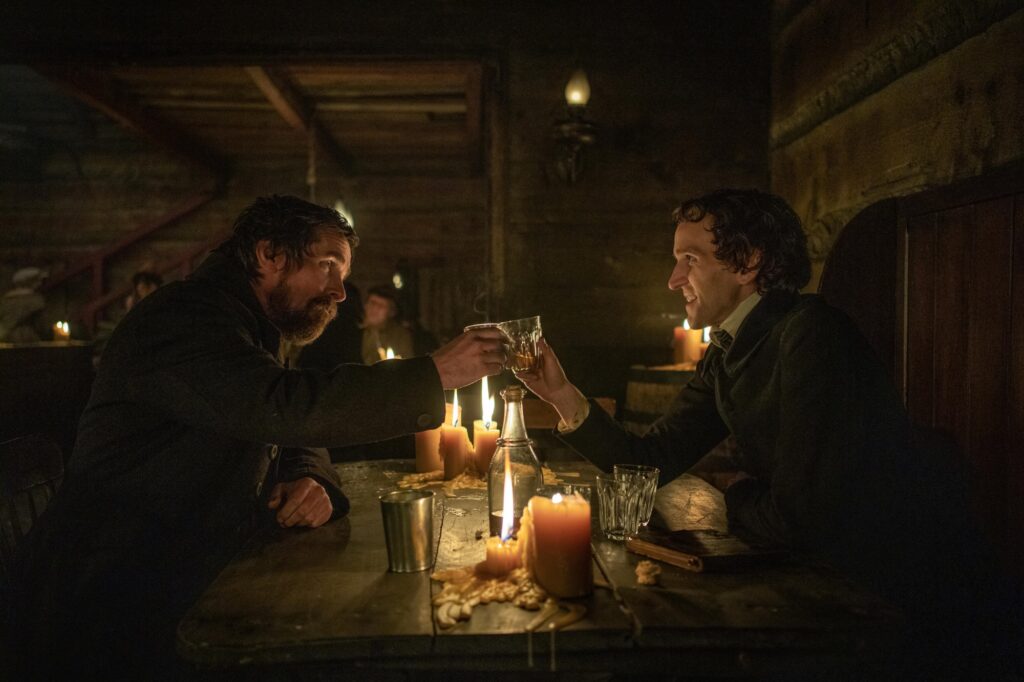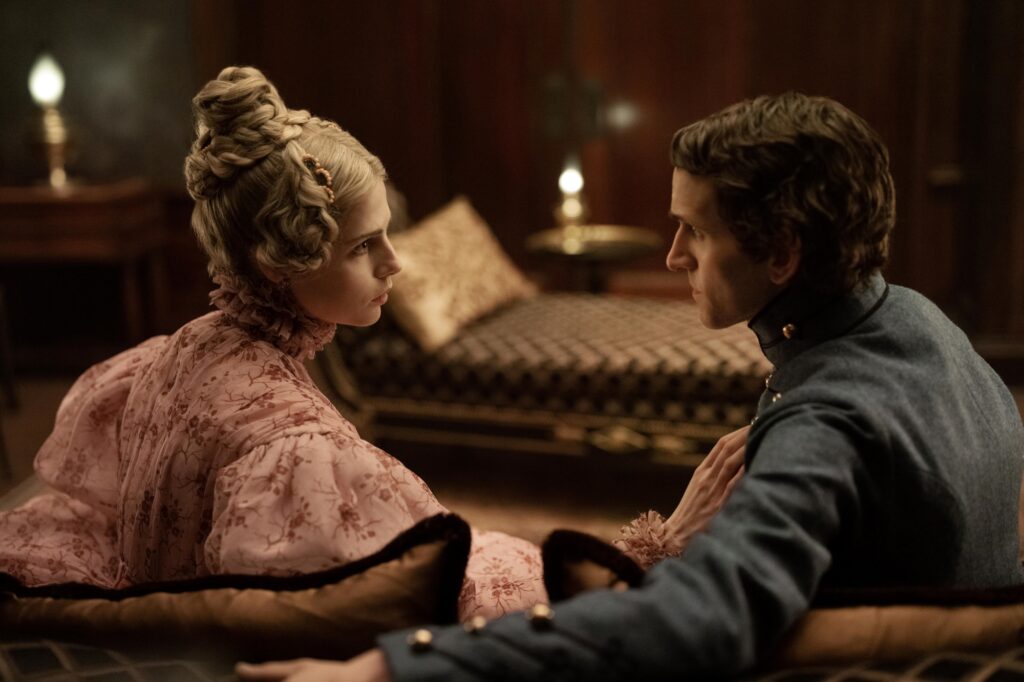Harry Melling, best known for his roles in the Harry Potter franchise, The Queen’s Gambit and The Ballad of Buster Scruggs, now tackles the daunting role of Gothic literary figure Edgar Allan Poe, starring opposite Oscar-winner Christian Bale in Netflix’s The Pale Blue Eye. The Scott Cooper-directed mystery drama, based on the bestselling novel by Louis Bayard, recounts a series of occult murders at West Point Military Academy, in 1830.
The Pale Blue Eye opens on death: in the early hours of a grey winter morning, a cadet is found hanging. But after the body arrives at the morgue, tragedy becomes savagery when it’s discovered that the young man’s heart has been skilfully cut out. Fearing irreparable damage to the fledgling military academy’s reputation, its leaders turn to a local detective, Augustus Landor (Bale), to solve the murder quickly and discretely. Stymied by the cadets’ code of silence, Landor enlists the help of one of their own to pursue the case, an eccentric cadet with a disdain for the rigors of the military and a penchant for poetry – a young man named Edgar Allan Poe (Melling).
Outtake speaks with Harry Melling about cracking the role of Edgar Allan Poe, the attraction of difficult characters, and the magic of working with Bale.

Do you remember what first hooked you on this script?
Harry Melling: I do. I remember that my first thought was, “wow, this role is such an opportunity to play with so many different things. The range Edgar [Allan Poe] has to him in terms of what he has to go through was something that fascinated me and that I wanted to hopefully have a go at.
Beyond Edgar, there was also the whodunit nature of the story, which I found fascinating, as well as the Gothic landscape of the story. Those things combined put me in a place where I really wanted to offer Scott – the director – something that he could work with.
And such a beautiful landscape to be working against.
Harry Melling: Absolutely amazing – I mean, it was a brutal, cold, harsh landscape. But I think it just fed into the atmosphere of it. The fact that you were in these incredible places – literally freezing – fed into the nature of what it must have been like for these cadets in West Point at the time.
What’s particularly interesting about this role is that, although it’s an imagined version of the man, he was a real-life figure. How do you approach a role like that?
Harry Melling: My way of going about it was to do as much research as I possibly could. So I read as much as I could about him and about his work as I could, and then got to a point where I started building up this idea of what people saw him as.
And then the journey was: “Okay, where did that come from? What was his early life like? What are the things I can use to show an audience how he went from A to B?” And what I landed on was this idea that he had no sense of place. He lost his mum and dad very young, he was then adopted and taken away from Virginia to London, and he then went back to the States… he was a man who was always moving around, always having to acclimatise himself to different environments.

That sense of place was a fascinating thing for me to explore. It told me that this was a man constantly trying to reinvent himself, who was always performing to a certain degree. Simultaneously though, in order to get to that, I had to disregard some of his biography. There’s only so far that can take you because there needs to be room to invent and create.
And so, much like the novel and the script, there was a combination of truth – he did go to West Point in the 1830s – interwoven with this Poe-esque thriller narrative. That marriage between truth and fiction was a large part of my journey in discovering what a younger Edgar Allan Poe would have been like.
In all your research, was there a particular anecdote about his life that you really loved?
Harry Melling: There was a point when he decided that he didn’t want to stay at the Academy anymore, so he started smuggling alcohol into the barracks. And then he started not turning up, and all of this stuff was to try and get himself kicked out. I found that interesting, as well as the fact that he first decided to go to West Point in the hopes of getting some time to write – which I think is just stupid. Of course, he had no time to write! But all those little idiosyncratic things told me so much about young Edgar, which is that he’s the smartest person in the room, but he’s also the silliest. It was a lot of fun to tap into that.
There’s only so much we know about Poe, especially prior to his fame – were there other influences or references that you looked to for inspiration when cracking this role?
Harry Melling: I started to look at people whom I would deem eccentric – for lack of a better word –, people who were inventing themselves, or people who had troubling upbringings and decided that in order to engage with this world, they needed to reinvent themselves. And my job, certainly early on in the film, is to make sure that Landor falls in love with Edgar. If I achieved that, then we have a journey and we have room to explore that relationship.
Truman Capote became an interesting source. He’s from Alabama, and yet his whole demeanour is a kind of performance, which is intended to engage people in a certain way. I thought there was perhaps something of Edgar in that. Beyond that, there were so many inspirations: I started looking at a lot of silent-era movie actors, like Buster Keaton, because their expressive qualities and sense of loneliness and isolation are so interesting. For instance, Buster Keaton, with those expressive qualities.

The kinship between Landor and Edgar is such a pillar of this story. What conversations did you and Christian Bale have to find that relationship amidst everything else that was happening in the script?
Harry Melling: It’s a father-and-son relationship that evolves over the story. Everyone knows how extraordinary Christian is – yet beyond that, he’s also incredibly generous that building that relationship with him felt like the easiest thing in the world. We didn’t talk much about them as characters, but rather we’d turn up and see what revealed itself to us. That was the way we engaged with the narrative.
Christian’s superpower, if he had such a thing, would be the ability to be present in the moment. The way we evolved the narrative was going from moment to moment and seeing what revealed itself to us. Like I said earlier, my job was to make Landor want to follow Edgar, that he be intrigued by him – what is this cadet doing? Why is he pretending to be this flamboyant young poet? Who is he? Why is he no more than he’s letting onto? All that was very much the starting point from which the relationship developed. And I also think that Landor gives Edgar something that he searched for his entire life: this sense of belonging and of having a home. A sense of family and land that could fill that void in him.
When you have such a cast of eccentric, powerful characters – yours and Gillian Anderson’s characters being prime examples – how do you ensure that the story stays grounded and doesn’t succumb to an absurdist tone?
Harry Melling: I think that it’s down to Scott Cooper because tonally, yes, it could be a complicated piece to balance, so how do you anchor these flamboyant characters? How do you keep them grounded in this Gothic world? We also go to the occult, which maybe isn’t in keeping with the realism of a Scott Cooper film. It’s a wonderful tightrope to have to walk – and maybe there are times when Edgar did go too far in his performance, maybe there were times when he was a bit too much. But we would then pull it back, and then would push back a bit… it was a constant balancing act. And equally, when you get these superb actors like Gillian [Anderson], like Toby [Jones], like Timothy [Spall] you’re dealing with people who are well equipped to handle those nuances.
The Pale Blue Eye releases to Netflix on January 6th.
